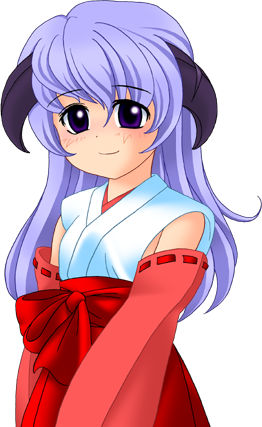[ home, rena, keiichi, rika, hanyu, shion & mion, satoko ]

Furude Hanyū (古手 羽入), usually simply Hanyū (羽入), is one of the main characters in the Higurashi no Naku Koro ni series, and the true identity of Oyashiro-sama. She is a goddess that appears in Minagoroshi-hen and beyond. Hanyū's past is shrouded in mystery, but she has referred to herself as a demon who became a goddess after she was sacrificed at a true Watanagashi ceremony centuries past to atone for the sins of others. She is also the mother of Furude Ōka and the wife of Furude Riku.
Hanyū is invisible for the majority of the series to the majority of the characters, and she is the source behind the mysterious footsteps in the story. She is also a sort of guardian angel to her descendant, Furude Rika, whom she has followed since birth. In fact, Rika is the first person to be able to see her even though Hanyū has been in the village of Hinamizawa for centuries since her death. As such, Hanyū regards Rika as her one and only friend despite the abuse she endures from Rika occasionally.
As revealed in Kotohogushi-hen, Hanyū was once known as the demon goddess of Onigafuchi (Hinamizawa) under her true name, Hai-Ryūn Ieasomūru Jeda. She traveled with her clan to the Onigafuchi Swamp and tried to coexist with the human villagers there, but she was discriminated due to her horns. Furude Riku, the heir to the Furude shrine and inventor of the nickname "Hanyū" (which is the way he heard the name of her kind, Hai-Ryūn, when she introduced herself), fell in love with the goddess and married her. They had a daughter named Furude Ōka, the first in a long line of humans to carry demon blood.
To protect the villagers from demons, she had to sacrifice her husband and lost her ability to appear in front of humans. Nobody was able to see her except for her daughter. To combat a strange disease that was spreading throughout the country, she created medicine and gave it to her daughter. However, powerful men desired the medicine for their political purposes, and her daughter was captured. Driven by fear for the safety of her daughter and bitterness from the betrayal of the very people she saved with the medicine, she became corrupted as a demon and massacred the villagers. Her daughter, knowing she had become corrupted with evil thoughts, battled Hanyū and successfully stabbed her with a sword. This brought Hanyū back to her senses; however, knowing she would one day turn evil again, she begged Ōka to kill her using her own sword, the only weapon capable of killing a demon. Since Hanyū's death, the villagers revered Ōka for driving away the "demon" and the legend of Oyashiro-sama's curse started.
Quiet, timid, and polite, Hanyū is a sweet and innocent girl, despite her tendency to refer to herself with the pronoun "boku (僕)," which is generally reserved for boys. She is easily intimidated or frightened, and will whimper "Auu~ auu~" when upset or excited.
When angry in the original anime adaptation, however, her pupils turn increasingly red, and her voice becomes stern, serious, and mature like that of a goddess or woman. Hanyū's change in voice is similar to that of Rika's. In the anime, the adult voice actresses play both roles for both characters. For Rika, the change between "Child Voice" and "Adult Voice" are quite clear; for Hanyū the change is more subtle, and Hanyū infrequently speaks in an Adult Voice even when addressing Rika alone.
In Matsuribayashi-hen Hanyū demonstrates her most marked shift into an adult voice by frightening the Yamainu with her Demonic Voice. In the anime, Rena compliments her by saying she sounds like a "real goddess." Hanyū responds happily embarrassed in her childlike character and voice. In the manga and the visual novel, Rika reminds everyone that Hanyū is a goddess. Later, in the original anime adaption and in the flashback from the Fourth Season, she speaks to Mion in her Adult Voice when she stands between her and Takano. She then shifts and addresses the rest in her more child-like voice.